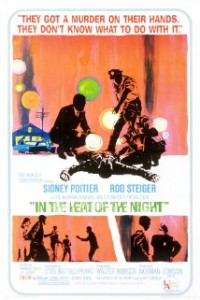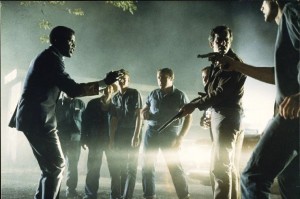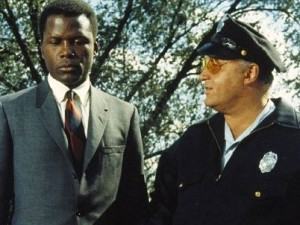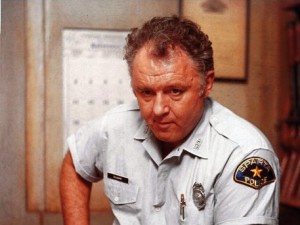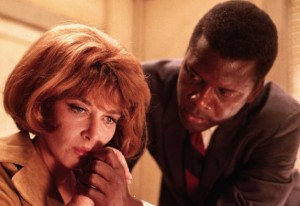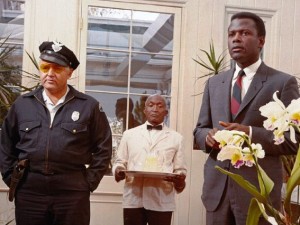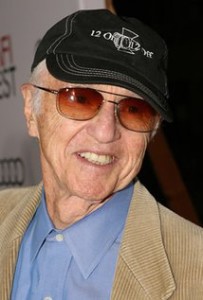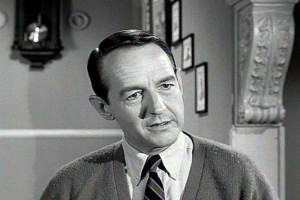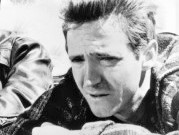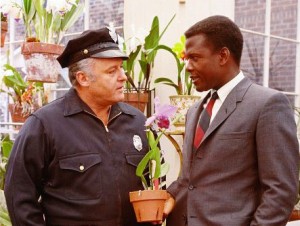In the Heat of the Night ***** (1967, Sidney Poitier, Rod Steiger, Warren Oates, William Schallert, Lee Grant, Scott Wilson) – Classic Movie Review 2,512
Director Norman Jewison’s stupendous 1967 detective thriller In the Heat of the Night showcases Rod Steiger’s storming Oscar-winning performance as racist bigot Southern sheriff Police Chief Bill Gillespie and Sidney Poitier’s distinguished, graceful performance as charismatic visiting Philadelphia African American city homicide cop Virgil Tibbs.
The sheriff’s deputy (Warren Oates) finds the body of a dead man and then arrests a random ‘coloured’ man (Detective Tibbs) he finds waiting in the wee small hours for a connection at the train station of a racially hostile small Southern town. Taken to the run-down police station, Tibbs is questioned by a scornful, dismissive Gillespie, but eventually reveals he’s a cop. Gillespie verifies this via a phone call Tibbs offers to pay for with Tibbs’s boss, who asks Tibbs to help investigate the murder.
Gillespie makes one of many attempts to refuse Tibbs’s help, but eventually asks him to assist as Tibbs is a homicide expert and he is not. The two start off at first sparring, then they find themselves reluctantly uniting, between a lot more sparring, to solve the perplexing murder case of a wealthy industrialist in the small town of Sparta, Mississippi.
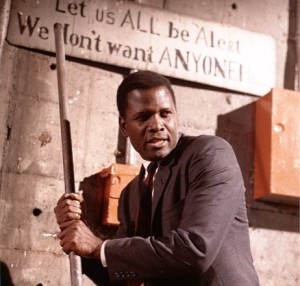
The brawl in the maintenance shed takes place under a sign that reads: Let us ALL be Alert. We don’t want ANYONE Hurt.
These were the days when the great Rod Steiger could turn in an unstoppable Best Actor Oscar-winning performance that combines being both exuberant and truthful. It has a strong claim to be Steiger’s best performance ever. And Poitier is remarkable too in a heated turn of simmering emotion – ‘They call me Mister Tibbs!’ he replies when Gillespie taunts him with ‘Virgil? That’s a funny name for a n***er boy to come from Philadelphia. What do they call you up there?’
Steiger has the rage and Poitier has the passion. They have a long series of great scenes together, but perhaps the most remarkable is the one in Gillespie’s home where he reveals his alcoholism and loneliness – and a new, deeper level of personal rage. Gillespie needs decades of therapy.
Controversially, Poitier was not even Oscar nominated, though he had previously won for Lilies of the Field (1963), becoming the first African American to win the Best Actor Oscar and the only one until Denzel Washington for Training Day (2001), 38 years later.
Steiger should also have won Oscars for On the Waterfront (1954) and The Pawnbroker (1964), but he had to be content with nominations.
Sterling Silliphant pens a brilliant screenplay based on a novel by John Ball, Haskell Wexler provides the distinguished cinematography, while Jewison keeps the movie supremely tense, hard-edged, strong hitting and yet humorous. And Quincy Jones’s jazz-based score is a haunting, atmospheric classic. Ray Charles sings the title song ‘In the Heat of the Night’. Alan Bergman and Marilyn Bergman wrote the lyrics for the song, with music by Quincy Jones.
Jewison is very good with his actors, producing a gallery of memorable characters. Warren Oates has a lot to do as the deputy Sam Wood, and does it well in a wily portrait of a truly dim policeman. William Schallert is excellent, in a brisk, tidy, convincing turn as the Mayor. Lee Grant slightly milks it as the deceased’s powerful, distraught widow who insists that Tibbs stays to investigate. Larry Gates is splendidly sinister in the Sydney Greenstreet fashion as the powerful Endicott. Scott Wilson (in his film debut) is notable as the fleeing suspect Harvey Oberst. [Wilson starred as Dick in In Cold Blood the same year.]
[Spoiler alert] The film ends well in a subtle, satisfying brief exchange that says everything. Chief Gillespie: ‘You take care, y’hear?’ Virgil Tibbs: ‘Yeah.’
The film also features Quentin Dean, James Patterson, Matt Clark, Anthony James, Larry Gates, Beah Richards, Peter Whitney, Kermit Murdock, Larry D Mann and Fred Stewart.
The film won five Oscars, including Best Picture, Best Actor, Best Adapted Screenplay, Best Sound (Walter Goss) and Best Film Editing (Hal Ashby). Its Academy Award success came as a surprise – and a disappointment – for the more favoured films The Graduate and Bonnie and Clyde.
There were two sequels (both with Poitier, but without Steiger) – They Call Me Mister Tibbs! (1970) and The Organization (1971) – and a TV series of 146 episodes followed in the Eighties (1988–1995) with Carroll O’Connor as Bill Gillespie and Howard E Rollins Jr as Virgil Tibbs.
The action is set in the heat of a Mississippi summer, but cotton pickers toil in the fields, which only happens in late autumn. It was filmed during autumn in Illinois, when actors had to keep ice chips in their mouths (and spit them out before takes) to prevent their breath from appearing on camera during the night scenes.
It was made in Sparta, Illinois, because Poitier insisted that the movie be filmed in the north after an incident in which he and Harry Belafonte were attacked by the Ku Klux Klan on a visit to Mississippi. The town’s name in the story was altered to Sparta so that local signs would not need to be changed.
Poitier names it as the favourite of his films. First choice for Chief Gillespie was George C Scott, but he was busy filming the forgotten The Flim-Flam Man (1967).
It is restored and re-released in UK cinemas on 18 November 2016.
As ever, Rod Steiger manages to work in his movie catchphrase:
Haskell Wexler, the cinematographer on Sixties and Seventies classics, including In the Heat of the Night, Who’s Afraid of Virginia Woolf? (1966), The Thomas Crown Affair (1968), Faces, The Conversation, One Flew Over the Cuckoo’s Nest (1975), Bound for Glory (1976), and Coming Home, died peacefully in his sleep on December 27, 2015, aged 93.
Considered one of the ten most influential cinematographers in movie history, he won Best Cinematography Oscars for Who’s Afraid of Virginia Woolf? and Bound for Glory and was nominated for One Flew Over the Cuckoo’s Nest, Matewan (1987) and Blaze (1989).
William Schallert died on 8 May 2016 at the age of 93.
RIP Scott Wilson, star of In Cold Blood (1967), who died on 6 October 2018, aged 76. His career took off after being discovered by director Norman Jewison, who cast him in his film debut as the murder suspect Harvey Oberst in In the Heat of the Night.
Sidney Poitier died in the Bahamas on January 6, 2022, aged 94. He married Canadian actress Joanna Shimkus on 23 January 1976, and they remained married. Poitier’s family lived in the Bahamas but while they were visiting he was born in Miami, which granted him US citizenship. He grew up in the Bahamas but moved back to Miami at 15 and to New York City at 16.
Canadian film director Norman Jewison was nominated for the Best Director Oscar three times in separate decades for In the Heat of the Night (1967), Fiddler on the Roof (1971) and Moonstruck (1987).
Canadian film director Norman Jewison (July 21, 1926 – January 20, 2024) was nominated for the Academy Award for Best Director three times in three separate decades for In the Heat of the Night (1967), Fiddler on the Roof (1971), and Moonstruck (1987).
© Derek Winnert 2015 Classic Movie Review 2,512
Check out more reviews on http://derekwinnert.com

